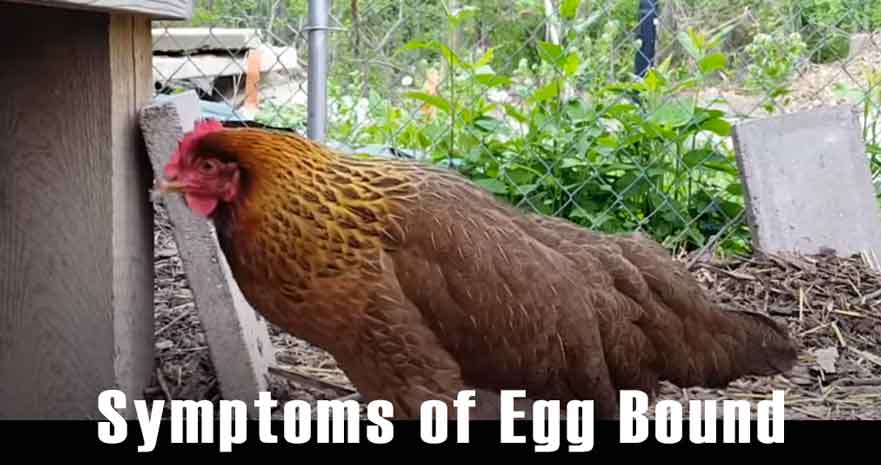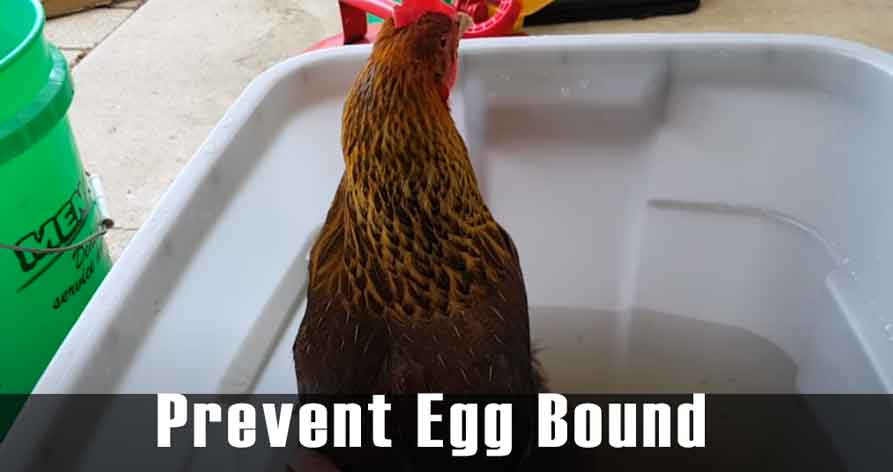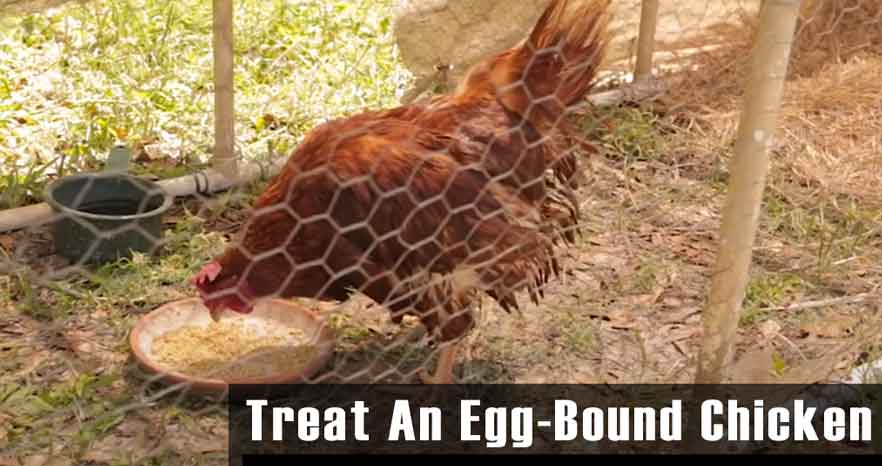Egg binding is a common problem in chickens during their egg production period. If you don’t take proper treatment and prevention, it could lead to a life-threatening situation. Recognizing the sign of egg binding is crucial to take appropriate treatment within time.
This way, the overall health condition will improve and increase egg production.

What is Egg Binding
Egg binding means an egg gets stuck somewhere in the chicken’s oviduct and cannot expel the egg from its reproductive tract. This is a severe condition and can be life-threatening for the chicken, so the bird needs immediate attention and treatment. Usually, the egg passes smoothly between the cloaca and the uterus; sometimes, the egg can get trapped near the area, and your hen will suffer a lot.
The stuck egg should pass within 24 to 48 hours to avoid significant injury. Sometimes surgical intervention may be necessary. Also, it prevents other eggs from being released. Egg binding can lead to various health issues such as infection, constipation, abdominal masses, etc.
Symptoms of Egg Bound
Chickens are prey species, and they are good at hiding their symptom. Sometimes you may miss the signs until it’s too late. You have to notice the symptoms that indicate the egg binding, such as,
Restlessness and Discomfort: An egg-bound chicken will feel restless and constantly move around their nesting area. Also, they will spend a long time in that area and walk a bit like a penguin. The hen will look uncomfortable.
Decreased Appetite and Drinking: Egg-bound chickens will show a loss of appetite. They become lazy and weak because of their disinterest in drinking.

Straining: Sometimes, the chicken pushes or pulls the egg to pass it through her vent. She may pump her tail up and down to lay eggs with pins in her body and face. The abdominal strain is not suitable for chicken.
Shaking: some chickens will feel tired and shake their feature for trying to push the eggs.
Droppings: the chicken will poop wet everywhere, or they won’t poop when the egg is binding.
Some other symptoms will be wet vents, frequent sitting, droopy comb and wattles, looking lethargic, etc.
What Causes Egg Bound in Chickens
Egg binding can cause for various reasons. Knowing these reasons will help you treat the chicken as soon as possible to prevent death.
Lack of Calcium and Vitamin: Calcium is essential for chicken egg formation. When the chicken has a calcium deficiency, the eggshell will be soft or weak and may break inside the oviduct, which causes egg binding. Also, a lack of vitamin D causes weak eggshells.
Obesity or Poor Body Condition: Obesity or poor body condition is another cause of troubling to expel eggs. This type of hen has weak muscles that cannot push the eggs to remove. It also puts pressure on the reproductive organs and the hen face difficulty in laying an egg.
Infection: Sometimes, the chicken could have an internal condition that affects the reproductive system. That also causes muscle weakness that leads to egg binding. Some internal parasites can cause egg binding too.
Genetic: Due to complex genetics, some chicken breeds have a higher tendency for egg binding.
Age: older hens have a weaker reproductive system so the egg-laying process will become less efficient. These are prone to egg binding.
How Do You Prevent Egg Bound?
Egg binding prevention is a relatively easy task. You only have to follow some rules, such as,

Provide Enough Food: provide food that is highly nutritious and well-balanced with calcium, vitamin, minerals, zinc, and more. They improve overall avian health that reduces the chances of egg binding.
Keep a Healthy Environment: the environment should be appropriate that increase the natural reproductive system. Provide good food, and an excellent nesting area, clean the coop regularly, make the coop predator-proof, provide good lighting conditions, etc. The temperature should be consistent with the appropriate humidity level.
Keep Them Active: physical activity prevents egg binding. Only cage them some of the time. Encourage them to play and. Chickens are messy birds; let them fight, messing around.
Observe Body Condition: it’s crucial to observe their body movement, behavior, etc., especially during their egg production period. Keep them in a healthy range and monitor their body weight. Check their eating habit, drinking patterns, and any abnormal behavior. Chickens often lose their appetite when egg binding happens. Take them to the VetVet regularly.
Don’t Provide Excess Supplement: excess supplements are unsuitable for egg production and their health. It disrupts the body’s balance and overall health. Extra treatment also causes obesity.

Regular Check Up: Consult a vet and take them for regular check-ups. The VetVet will identify your health condition and tell you the proper routine you should follow.
How To Treat An Egg-Bound Chicken
When egg binding occurs, treat your flocks as soon as possible, as it can be life-threatening for them.
Observe the Situation: observe the chicken’s behavior and physical condition. Touch their abdomen to check if there is any egg. Keep them in a warm area to relax and reduce stress.
Bath: gently fill a sink with warm water and gently place the chicken in the water. Hold them tightly as they will try to escape. Keep the chicken in the water for around 15 minutes so the muscles will relax. Also, provide healthy water through the right chicken waterer for the ill chickens.

Use Gel: Apply water-based lubrication like KY gel to the vent area so the egg can pass or move. Gently massage the abdomen and vent area with a circular motion.
Take Them to the Vet: if a warm bath and gel massaging don’t work, take the chicken to the VetVet before worsening the condition.
